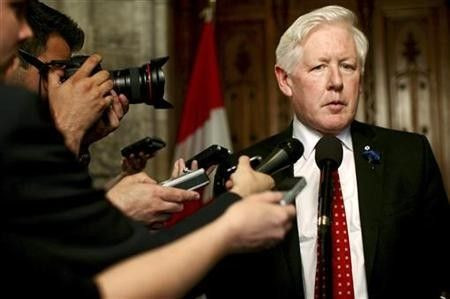Liberal leadership rebuffs united left calls

The leader of the Liberals, a party reduced to also-ran status in the May federal election, on Tuesday rebuffed the idea of an alliance with their left-of-center rivals, even as a former party leader touted a merger as the only way the left would win back power.
Asked about working with the New Democrats, Liberal leader Bob Rae said Liberals needed to focus on rebuilding into a strong fighting force that occupied the center and would be able to grow the economic pie.
The problem I have with NDP polices is quite clear, Rae, himself a former New Democratic premier of Ontario. They always take the pie for granted.
NDP policies are mostly to the left of the Liberals in terms of tax rates and social spending, and both are to the left of the small-government, low-tax Conservatives.
All three parties promise balanced budgets, although their paths to that goal differ greatly.
The NDP ousted the Liberals as Canada's official opposition in the election, vaulting from fourth place to second under the leadership of charismatic Jack Layton.
But Layton died suddenly last week, leaving the NDP facing its own leadership race and emboldening some Liberals to muse about the sensitive idea of a left-left merger.
Under current voting patterns this could subsume the Liberals, a party that was founded in the 19th century and was long Canada's party of government, into a previously smaller and far younger rival.
Former Liberal Prime Minister Jean Chretien said this weekend that a merger was the only way to stop the Conservatives, and Michael Ignatieff, the party's leader up to the May election, noted the common values the parties share in a widely reported Facebook post.
At Jack Layton's funeral service...I thought, yes we are separate families, separate traditions, and yes, we've fought each other over the years. But now sitting together in the same hall, isn't it obvious how much we have in common? he said on the social media site (link.reuters.com/vuf53s).
CHARMING VOTERS
The New Democratic Party, founded in 1961, has never formed a federal government.
But Layton charmed voters with his enthusiastic, direct style. The NDP won a record 103 seats in Canada's 308-seat Parliament, more than half of them in French-speaking Quebec.
It's far from clear if another NDP leader can outdo Layton in winning votes and win a majority government. But Karl Belanger, who worked for Layton and is now press secretary to interim leader Nycole Turmel, cast doubt on the idea of a deal with the Liberals. I don't see it happening, he said.
The Conservatives won power after the merger of two right-wing parties, forming minority governments in 2006 and 2008 and translating that into a defeat-proof majority in May. Under Canada's first-past-the-post voting system a party can win seats without having a majority of votes if the rest of the vote is split between rival parties.
But even a Liberal-NDP merger might not guarantee victory at the next election, scheduled for 2015, because some Liberal voters might vote Conservative rather than voting for a party that was too closely tied to the NDP.
The Liberal team is just not interested in that proposition, deputy Liberal leader Ralph Goodale said. The center when properly defined is a powerful place to be and it's a winning place to be.
Rae and Turmel are both interim leaders of their parties. A Liberal leadership race is due in 2013, while the NDP will probably choose a new leader next year.
© Copyright Thomson Reuters 2024. All rights reserved.





















